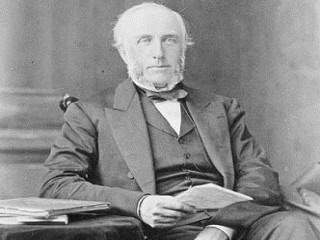
George Brown (politician) biography
Date of birth : 1818-11-20
Date of death : 1880-05-09
Birthplace : Alloa, Scotland
Nationality : Scottish
Category : Politics
Last modified : 2011-05-24
Credited as : Politician, newspaper editor, The Globe and Mail
George Brown was a Canadian politician and newspaper editor who stood for the principle of majority rule, favored expansion into the West, and gave powerful support to the movement for the federation of British North America.
George Brown was born in Alloa near Edinburgh, Scotland, on Nov. 20, 1818. Educated in Edinburgh, he emigrated to the United States with his father at the age of 20 and settled in New York. There the Browns began a newspaper, the British Chronicle. Not finding life in New York to their liking, they moved in 1843 to Toronto, Canada, where they established a Presbyterian newspaper, the Banner.
A year later the younger Brown founded the Globe, a political journal designed to appeal to the residents of Toronto and the Protestant rural area in the western part of the province. In this newspaper Brown began to expound the views that made him a power in politics: dissatisfaction with the system of equal representation in the legislature for the French-and English-speaking parts of the province and the favoring of its replacement by "representation by population" ("rep. by pop."), which would ensure an English-speaking majority. He also thundered against the dominant influence which he felt was exercised by French-Canadians in the Conservative ministries of John Macdonald, and he criticized the power of the Roman Catholic Church in political affairs.
In Canada West, Brown was particularly concerned about the attempt to establish separate Roman Catholic schools with state support. Brown also urged the annexation of the Hudson's Bay Company territories to Canada, regarding them as a new agricultural frontier for the province and hoping to see Toronto outbid Montreal to become the commercial center for the West. His attitudes coincided with those of the Reform, or "Grit," party in Canada West, and Brown slipped naturally into a position of leadership in the party. The Globe took over other Reform papers and soon became the official organ of the movement. It eventually became a daily, very widely read throughout Canada West. No editor or newspaper has since possessed the influence in central Canada which was wielded by Brown and the Globe.
Brown entered politics in 1851, being elected as a Reform candidate for the county of Kent, Canada West. In the legislature he soon made his mark as a critic and formidable debater, but his views about French-speaking Canadians made for an uneasy relationship with the reformers of Canada East, the Rouges. In 1858 there was a short-lived attempt to construct a Reform ministry headed by Brown and A.-A. Dorion, but the new administration could not win the confidence of the House. The next year Brown and the Reform party adopted the goal of a federal union for the two Canadas, leaving each part free to manage its local affairs.
In June 1864 the increasing political difficulties and frustrations of the early 1860s finally led to the creation of a coalition ministry to carry forward the plan of the union of all the British North American colonies. Brown's adherence was critical to the purpose of the new government, and there was much satisfaction when he swallowed his personal dislike of the Conservative leader, Macdonald, and joined the coalition. Throughout 1865 Brown worked for the cause of federation, resigning from the ministry at the end of the year, when he found he could no longer work with Macdonald and his Conservative colleagues. The break did not interrupt Brown's powerful support, on the platform and through the pages of the Globe, for the realization of a federal union in British America.
The first election after the formation of the Dominion of Canada, in July 1867, saw the Conservatives under Macdonald installed as the national government. Brown was defeated in this election, although he continued to play an active role in Ontario provincial politics. In 1873, with the accession to power of the Reformers, or Liberals as they were now beginning to be called, Brown was named to the Senate of Canada. Although relatively inactive in the upper house, he exerted a strong influence over the new Liberal prime minister, Alexander Mackenzie, who had been his protege. In 1874 Brown was sent to Washington to negotiate a new reciprocity treaty with the United States, but the agreement was turned down by the U.S. Senate.
Brown's last years saw him much involved in the management of his newspaper, now a large enterprise. His life ended tragically when he was shot and fatally wounded by a disgruntled employee whom he had recently discharged. Brown died on May 9, 1880.
















